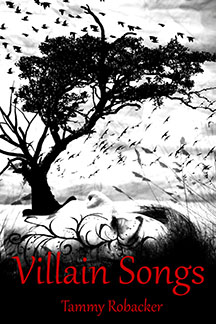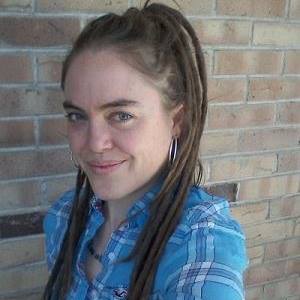
ubmitting is an act of vulnerability: to take what you’ve written and then subject it to being assessed by someone else. Someone you don’t know. Whether you’re an essayist putting your darkest moments on the page or a novelist who creates a potentially risky plot, submitting the words you birthed is a brave act. Not to mention that before submitting, it can feel as if you’re all alone in the swirl of your fragile words; so the thought of opening yourself up to potentially damaging judgement doesn’t sound too appealing. But know this: we writers will always feel alone if we don’t share our writing—specifically, if we don’t submit it.

Tammy Robacker, an award-winning poet and author of the recently released Villain Songs, knows all about this. Her poems grapple with and explore complex topics, such as family, loss, grief, the body, women’s issues, and many other kinds of difficult emotional subject matter. Writing about the hard stuff is challenging, but submitting that work for publication can be its own petrifying process. From rejections to discouraging reader responses, Robacker has journeyed her way through these submission complexities as she crafted poems that would eventually win prizes and see publication. In the following interview, Robacker provides a number of helpful suggestions for all writers who are confronting the submission process with their pages brimming with the hard subjects. Robacker’s guidance includes how to reveal and recognize moments of grace and hope in both writing and submitting vulnerable work.
“We writers will always feel alone if we don’t share our writing—specifically, if we don’t submit it.”
Chelsey Clammer: What kinds of experiences (both positive and negative) have you had that stemmed from submitting and publishing deeply personal poems?
Tammy Robacker: In general, a growing audience of strangers, readers, and women and men draw nearer to you and want to know you because something you wrote touched them or connected with them on a deep or important level. Publishing my work has grown a circle of support around me that reaches across the globe and consists of people who understand my work and the integrity of my truth-saying behind what I write. And ironically, it also pushes people out of my inner circle of trust and closeness. Those, who are uncomfortable with the past or the act of calling out, who want to control my reality or my dreams, or who are unhealthy for me or my writing trajectory and purest life journey, all out themselves, so to speak, in this arena, too. Poetry clears my path in some of the most meaningful, truthful ways, although it comes with its own losses and pain, too. Being a poet and telling your truths in the age of social media are the surest ways to see how you get ignored, deleted, and blocked on levels that transcend Facebook and Twitter—even by family or those dear old high school friends.
Robacker’s thoughts on circles of friends and how submitting and publishing work can shift those relationships reminds me of a discussion I recently had with my husband.
Husband: I feel like we’re secluding ourselves and not spending enough time with our friends.
Me: I hang out with my friends all day.
Husband: No, you sit in front of your computer all day.
Me: Yeah.
Husband: ?
I know my computer does not physically look like a friend. But here’s the deal: most of my friends are people I’ve never met. We are all writers and know of one another through our work that addresses the hard topics. So although I might look like I’m just typing away and staring at a screen all day, I’m constantly having conversations with some of my best friends through emails, Facebook chats, and texts. We talk about the struggles we’re having with trying to write about a certain traumatic event or how a significant other reacted to the latest piece we’re working on. We also chat about the writing life in general or even give each other the space to talk about what’s troubling us. It is through writing about hard topics and then submitting my work that I have gained some of my closest friends. Volunteering with literary journals, contacting authors whose work I connected with, and even being a part of online writing workshops have all introduced me to some of the most significant people in my life—women whom I’ve never met, yet women who know me better than I know myself.
“Yes, the world is ready for me. There is a place for me, for my voice, for my secrets, for my pain, for my way of seeing.”
CC: What was it like to have your first poem published that addressed emotionally challenging issues?
TR: I think I was very gobsmacked, wowed, and deeply honored when Arsenic Lobster and the Seattle literary arts journal, Menacing Hedge, accepted groupings of poems about childhood trauma that I had written a couple years ago. These poems had been rejected and rejected. Over and over. Rejected. No, Thank You. Nope. So, I began to panic as to whether I was expecting too much to have such taboo and difficult subject matter accepted into publication or put into the world. But then, one after the other, these acceptance letters for the poems began coming in, and it finally hit home. That realization of: Yes, the world is ready for me. There is a place for me, for my voice, for my secrets, for my pain, for my way of seeing. It was an empowering moment.
To have my entire collection of poetry, Villain Songs, get accepted for publication was the ultimate wind in my poetry sails. It was the sweet reward to a long personal journey of pain, writing, and work.
In 2012, I finished writing a collection of essays about trauma, sexuality, mental illness, and alcoholism and submitted it to a number of agents and publishers—sixty-two total, in fact. Within a year, I had collected sixty-two rejections for BodyHome. The predominant theme of each response was that it was “too taboo” or “too dark.” So I gave up. The world didn’t want to hear about my “taboo” experience. Fine. I considered that collection as practice and started to write a new collection. A year later—two years after I had completed BodyHome—I submitted a prose piece to a contest. When I received the email that said I had made it to the final round, the editor also sent me another email stating that she loved my writing and was wondering if I had a manuscript. Well, indeed I do! I sent her BodyHome. And BAM! My too-taboo, too-dark essay collection was published nine months later. I guess the world was finally ready for my words. BodyHome never would have been published if I hadn’t continued to believe in the importance of sharing my tough experiences, if I hadn’t kept writing and submitting.
CC: What other benefits have you discovered from submitting your work?
TR: Besides the honor and affirmation of publishing your own poetry, the people in poetry become the beautiful gift that comes along with writing and publishing. Writers, you admire or discover or connect with from reading their work in journals or hearing them give readings or meet in workshops, become accessible to you for friendship or work partnership or in creative endeavors. It’s very rewarding and inspiring to constantly be meeting other writers from around the world who are saying and writing important work that touches your life!
Agreed. One of my favorite authors is Marya Hornbacher. In 2008, her memoir Madness, which is about bipolar disorder and alcoholism, spoke to me so deeply. I felt like I was reading my own thoughts on each page (though they were written way better than I could have ever done!). Two years later, and through a series of completely random events involving a bookstore, a coffee shop, a weekly six-hour commute, and an impromptu independent study, Marya and I met, became best friends, and even lived as roommates in an apartment together. This is the power of writing, of how the universe lines itself up for us when we write, submit, publish, read, and face our emotionally taxing experiences with one another.
“I always encourage poets and writers to ‘find their tribe.’”
CC: What advice do you have for other writers who are considering submitting their deeply personal work to journals?
TR: I always encourage poets and writers to “find their tribe.” If you are writing about mountains and herons and birch trees, go find the nature poets, read poems about the natural world, and submit work to journals that publish those themes and topics. If you are writing about women’s issues, aging, motherhood, or coping with cancer, find those poets, people, and places that honor your story and your experience. They are out there. You are not alone.
Indeed. Even just reading this interview has already connected you to two female writers who are also exploring difficult subject matter in their work. If you are hesitant to write about painful experiences because you worry about exposing yourself to the world, about being vulnerable to people’s judgements, or about how people might react, just remember that submitting your work also carries the possibility of creating deep, life-long connections with other writers. What else is there to do with our stories of survival?
“Submitting your work also carries the possibility of creating deep, life-long connections with other writers.”
Next month, we’ll explore how to support your fellow writers when submitting their work—which is another way of saying how to deal with jealousy or disappointment when it feels like everyone you know is gathering acceptances all over the place and you are not.
***
Tammy Robacker is a Hedgebrook writer-in-residence and graduated from the Rainier Writing Workshop MFA program in creative writing, poetry at Pacific Lutheran University (2016). She won the 2015 Keystone Chapbook Prize for her manuscript, 'R'. Her second poetry book, Villain Songs, is forthcoming with ELJ Editions in winter 2017. Tammy published her first collection of poetry, The Vicissitudes, in 2009 (Pearle Publications) with a generous TAIP grant award for poetry. Tammy’s poetry has appeared in or is forthcoming in Alyss, Lumen, FriGG, Tinderbox, Menacing Hedge, Chiron Review, Duende, So to Speak, Crab Creek Review, WomenArts, and many more. Tammy was born in Germany, raised in Pennsylvania, and currently lives in Oregon with her fiancée. Visit the poet: www.tammyrobacker.com
To purchase a signed copy of Tammy Robacker’s new poetry book, Villain Songs, please visit: https://www.tammyrobacker.com/villain-songs

Chelsey Clammer is the author of BodyHome and won the 2016 Red Hen Press Nonfiction Manuscript Award for her essay collection, Circadian. Her work has appeared in The Rumpus, Essay Daily, McSweeney’s, and Black Warrior Review, among many others. She’s the essays editor for The Nervous Breakdown. @ChelseyClammer www.chelseyclammer.com.
Chelsey is also an instructor for WOW! Women On Writing. She’s offering column readers a Submissions Consultation of up to 12 pages (4,500 words). Find out more.
-----
Previous columns:
How to Hold Your Horses
Caring About cover Letters (because nothing says “please reject me” like a terrible first impression)
Find or Fling? Figuring Out Where to Submit
Rejection Acceptance: Interview with author/editor Jac Jemc
Hard-Working Writer Seeks Widely-Read Journal
What My Submissions Spreadsheet Teaches Me
Submit ’Til You Make It